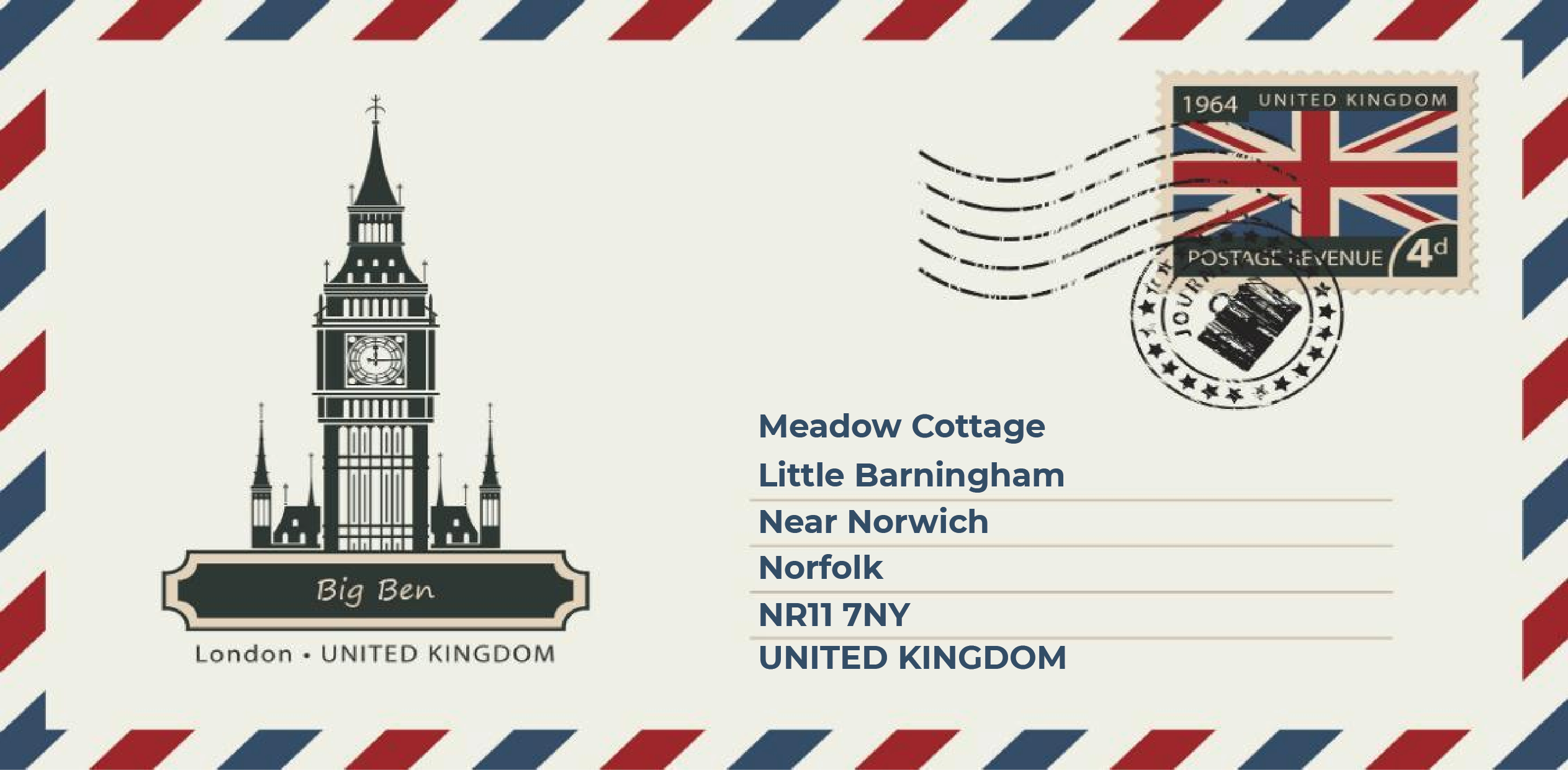Ever found yourself staring at an empty envelope, unsure of how to start jotting down to send a Parcel to UK?
Whether you’re a seasoned traveler or sending your first parcel abroad, addressing mail to another country can sometimes feel like solving a cryptic puzzle.
Although it may initially appear difficult, it is easy to grasp after you break the code down into its component pieces and know how to refer to each one separately. The area, district, sector, and unit are the four components that make up a UK postcode.
- In this blog, here’s what you will learn about-
– The significance of the postcodes in addressing parcel to the UK
– How Addresses Vary Across the UK
– How a Resident Postcode Should Be Written in a Parcel to the UK?
– The Value of Entering the Proper UK Address Format
– FAQs
– Conclusion
This guide is your key to ensuring your mail reaches its destination efficiently and effectively in the UK.

The Significance of the Postcode in addressing Parcel to the UK
Alphanumeric postcodes for the UK typically have two components that are separated by a space. While the second portion, known as the inner code, directs mail to a specific address or set of addresses inside that district, the first part, known as the outward code, indicates the postal district and the mailing office.
How Addresses Vary Across the UK
Urban and rural locations might differ greatly in addressing. Addresses in cities are usually simpler, just containing the name and street number. Rural addresses, on the other hand, would not have a street number but instead might feature the name of the hamlet and occasionally even a description of the location.
How a Resident Postcode Should Be Written in a Parcel to the UK?
While writing an address for mail or products varies, creating a postcode is always done in the same way.
This is a step-by-step guide explaining how to properly enter a postcode in an address when mailing a letter.
Step One- Make sure to align the text to the left and mention the addressee’s name in the first line. The name needs to be stated in this manner:
Mr. John Doe
For business, you must provide the name of the company or organization and the name of the building in different lines; we will discuss this in more detail in this blog. For a PO box address, you must include the PO box number in addition to the organization’s name.
Step Two- If the address is a house, the next step is to state the house number and street. The house and street number should be mentioned in a separate line that is aligned left. For businesses, only the street number is required; you can omit this step for the PO box. A comma or full stop should not be used when giving the street number.
125 High Street (street)
Step Three- Writing the post town name in the next line is the third step. The name of the town or city must appear in capital letters.
KENSINGTON (city)
Step four- This is the place where the address’s postcode will be added. The final line of a UK address is where a postal code should go. The outward and inward codes should be separated by a single space, and all letters must be capital or uppercase.
W8 6NA
Here is the List of Area postcode UK, If you want to check the area Postcodes.
Once you have completed the aforementioned procedures, your address format should resemble the one shown below:

Now that you know the process for writing mail, let’s look at how to write mail for a business address.
Writing a business address correctly is crucial for ensuring that your correspondence reaches its destination promptly and without confusion. Here’s a detailed breakdown of how to structure a business address, especially when addressing mail to a company in the UK:
- Elements Included in a Business Address: Name of Recipient or Name of Company: Let’s start with the firm name. Put the recipient’s name and optionally their job title before the company name if you are mailing the letter to a specific person at the organization. By doing this, you can be sure that when the mail arrives, it gets to the proper recipient. For example
Acme Ltd.
Attn: Ms. Jane Doe, Marketing Director - Name of the building, building number, and street: This section should contain the exact location inside the complex or street. Provide both the name and the particular building number if the firm is housed in one. In the event that the building name is absent, the street address will do. For example
123 Kingsway - Business Park or Building Complex (if applicable): This portion of the address can be very helpful in determining the precise location of the business if it is located within a particular business park or a bigger building complex. For example
Regent Business Park - City or Town: The town or city’s name needs to be written after that. To make it stand out, it is typically written in capital letters. For example
LONDON - Postal Code: In order to route mail to the appropriate sorting office, the UK postal code is an essential component of the address. Make sure it is precise and belongs on a separate line. For example
SW1A 2AA
- Formatting Tips
Alignment: Business addresses are typically left-aligned.
Font: Use a clear, legible font if printing labels or writing by hand. This prevents any misinterpretation during sorting.
Punctuation: Avoid using commas or full stops in the address lines. UK addresses generally do not include punctuation marks.
Capitalization: It is customary to write the town or city name and the country in all caps. This helps postal services quickly identify key sorting information.

Let’s now explore what constitutes a rural area and how to properly forward a parcel via courier to a rural location in the United Kingdom.
What are Rural Areas?
Rural areas are regions located outside the dense urban centers and suburbs. These areas are characterized by small populations, sparse housing, and often large distances between homes and businesses. Infrastructure such as roads and postal services can also be less developed compared to urban areas.
Rural addresses may include several elements not commonly found in urban addresses, reflecting the geographical and infrastructural realities of these areas:
Property Name: In many rural areas, especially in places like the UK, properties often have names instead of street addresses. This is an historical attribute where estates, farms, and houses in sparsely populated regions were individually named. For example-
Meadow Cottage
Locality or Village Name: Rural addresses might not have a street name but will often include a locality or a village name. This part of the address helps postal workers identify the smaller region within the broader rural area. For example-
Little Barningham
Nearest Town: Including the name of the nearest town can help in pinpointing the area where the property is located, especially if the locality or village is not well-known. For example-
Near Norwich
County: The county is an important element in rural addresses, as it helps sort mail regionally and aids delivery services in categorizing areas especially when names are duplicated in different regions. For Example-
Norfolk
Postal Code: In rural UK addresses, the postal code is crucial as it often pinpoints a much smaller area or even a specific set of buildings. It’s one of the most precise tools for identifying the location for example-
NR11 7NY
Country: For international mail, including the country is essential to guide the international sorting facilities. For example
UNITED KINGDOM

- Tips for Addressing to Rural Areas
Clarity and Completeness: Given the less structured nature of rural addressing, it’s crucial to include as much detail as possible to assist the postal services.
Local Knowledge: Sometimes, consulting with the recipient for the most commonly used version of their address can prevent misdelivery, especially in regions where local knowledge significantly influences delivery practices.
Check Postal Codes: Always verify postal codes as they are critical in rural deliveries. Errors can lead to significant delays due to the distances involved.
The Value of Entering the Proper UK Address Format
It is essential to use the proper UK address format for a number of reasons, all of which support timely and dependable mail and package delivery. In addition to guaranteeing that your mail reaches its destination promptly, understanding and following the standard format is important for the wider domains of services, communication, and business.
- Ensures Prompt Delivery – The primary reason for using the correct address format is to ensure that mail and packages are delivered promptly. The UK postal system, managed by Royal Mail, relies on a precise format to sort and route mail efficiently. Misformatted addresses can lead to sorting errors, misdeliveries, or returned mail, which results in delays and potential additional costs.
- Reduces the Risk of Lost Mail – An incorrect or poorly formatted address increases the risk of mail being lost. Given that certain areas, especially rural or newly developed regions, might not be as well mapped, using the precise postal code and correct sequence of address lines ensures that the delivery points are accurately identified by postal workers.
- Supports Automated Sorting – Automated methods are used by Royal Mail and other courier firms to sort mail. To sort each piece of mail according to its destination postal code, these systems scan the address labels. Properly structured addresses work well with these technologies, making sorting and handling faster and more precise.
- Boosts Performance in Businesses – Businesses need to use the right address format to manage inventories, keep customers satisfied, and make sure shipments get to partners and consumers on time. Inaccurate address information can result in disgruntled clients, higher return and reshipment expenses, and a damaged reputation.
Frequently Asked Questions (FAQs)
How do I find the correct postal code for a UK address?
Guidance on using tools like the Royal Mail’s postcode finder to locate the correct postal code.
What if my parcel has the wrong postcodes and wrong address format?
Your package may be held by Royal Mail for up to eighteen days if the postcode or address format is incorrect. If it is not claimed after that time, it will be returned.
What are the distinctions between mailing to rural and urban locations in the United Kingdom?
Insights into the unique ways that people address in rural locations, such using landmarks or local names.
Conclusion-
By mastering the UK address format, you’re well on your way to ensuring smooth and efficient delivery of your international correspondence. Remember, each element of the address helps guide your mail to the exact location intended, overcoming geographical and logistical barriers.
For more guidance or to ensure your parcels meet all necessary criteria, feel free to check out our services at DTDC. We make international shipping easy, providing you with all the resources you need to send your mail abroad confidently.
Visit DTDC’s website today to learn more about our international shipping options and how we can help you bridge the distance with ease!














